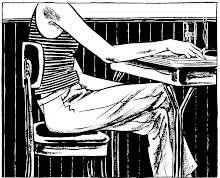What is CWC?
Since its inception in 1998, the Community Working Classics program at Grand Valley State University has provided classes in the liberal arts to over one hundred and fifty community students at Project Rehab and Job Corps in Grand Rapids, MI, and the Muskegon Correctional Facility in Muskegon, MI. These classes, ranging from Moral Philosophy to English Literature to American History, are taught by upper-level GVSU students under the supervision of Grand Valley faculty.
Community Working Classics operates as a seminar in political philosophy with an emphasis on service. It raises, with some urgency for all involved, questions that are often addressed only theoretically in the traditional classroom. Why are people poor? Incarcerated? Can serious engagement with the disciplines of the liberal arts address the very real desire we all have to live better, fuller lives no matter our circumstances? What can these seemingly diverse populations learn from one another? Will these lessons make any difference?
Participating GVSU Students:
- Are introduced to the principles of community organizing and recruiting.- Experience the work associated with developing a service organization.- Examine various philosophical, political, economic, sociological and historical issues raised during sessions.- Participate in readings to provide context for group discussion and essays.- Travel to Chicago during the course of the year to meet with teachers, organizers and others involved in similar projects.- Serve, teach, reflect, discover, and learn.
The Community Working Classics seminar is open to qualified students willing to commit to a full academic year. Students are required to submit a substantial essay during their involvement and will earn 3 or 4 credits per semester for PHI 380.
Community Working Classics operates as a seminar in political philosophy with an emphasis on service. It raises, with some urgency for all involved, questions that are often addressed only theoretically in the traditional classroom. Why are people poor? Incarcerated? Can serious engagement with the disciplines of the liberal arts address the very real desire we all have to live better, fuller lives no matter our circumstances? What can these seemingly diverse populations learn from one another? Will these lessons make any difference?
Participating GVSU Students:
- Are introduced to the principles of community organizing and recruiting.- Experience the work associated with developing a service organization.- Examine various philosophical, political, economic, sociological and historical issues raised during sessions.- Participate in readings to provide context for group discussion and essays.- Travel to Chicago during the course of the year to meet with teachers, organizers and others involved in similar projects.- Serve, teach, reflect, discover, and learn.
The Community Working Classics seminar is open to qualified students willing to commit to a full academic year. Students are required to submit a substantial essay during their involvement and will earn 3 or 4 credits per semester for PHI 380.

